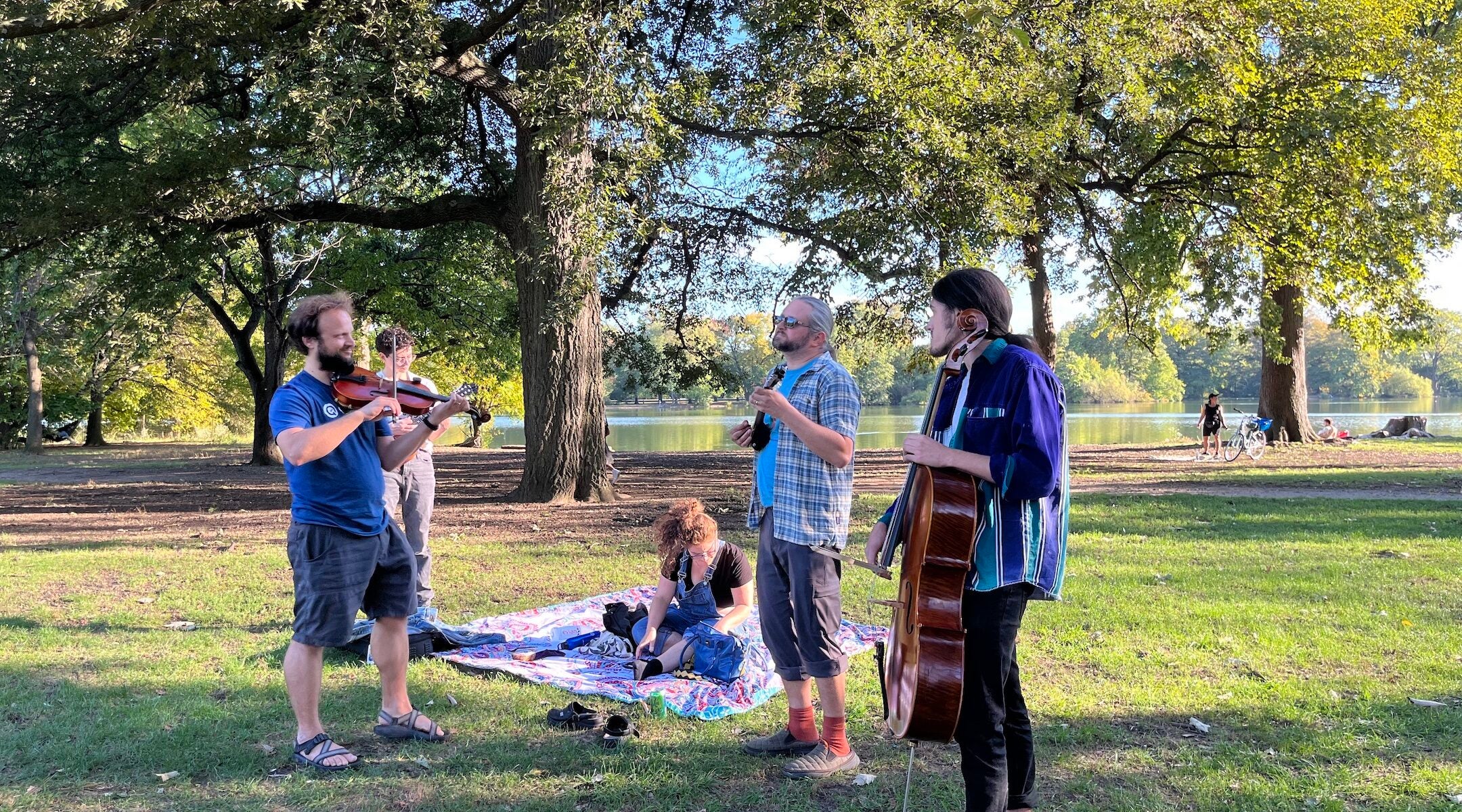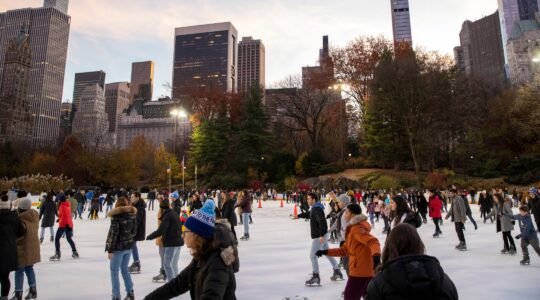(New York Jewish Week) – After five consecutive days of rain — which included Judaism’s holiest day of the year, Yom Kippur — the sun finally shone brightly on Thursday, Oct. 6. That warm afternoon, Brooklyn’s Prospect Park was alive with bikers, runners, dogs, parents, strollers and readers.
In one corner of the park, in a lakeside area called the Peninsula, a group of like-minded musicians and listeners of all genders and ages, from places as far away as eastern Europe, France and England and as close as Park Slope and Crown Heights had come together to enjoy the weather, catch up and improvise klezmer music together.
Known as the Brooklyn Klezmer Picnic, the informal, regular gathering is organized via a Facebook group of the same name. Spearheaded by Ilya Shneyveys, a 39-year-old klezmer musician who leads the band Forshpil, the picnics began in the summer of 2020 when performance spaces — along with everything else — were shuttered due to the COVID-19 pandemic.
Since then, there have been 23 of these picnics, which happen once a month-ish, always in Prospect Park.
“At its best, it’s a five-hour long jam session,” said Aaron Bendich, who runs the klezmer and Jewish music-focused record label “Borscht Beat.” Bendich said he comes to as many of the picnics as he can.
Shneyveys had started a similar gathering with friends in Berlin in 2013, known as the Neukölln Klezmer Sessions (named for the neighborhood where they all lived). Over the years, these casual public gatherings — which happened every few weeks and continue to this day — grew to attract a crowd of hundreds, and eventually branched into a yearly festival called Shtetl Berlin.
“I like informal music-making,” Shneyveys told the New York Jewish Week. “I think it’s a good environment for klezmer music in particular — it’s not a concert performance, but it’s not rehearsal, either. It’s somewhere in between. You get together and you play music and you don’t exactly know what’s going to happen. It’s a nice mix of predictable and unpredictable and in general it’s a nice communal activity.”
Shneyveys moved to New York in 2017 with his wife Sarah Myerson, who is currently the cantor at Kane Street Synagogue. And while he played gigs and met other klezmer musicians, he quickly noticed that “there wasn’t exactly a semi-regular gathering where people could meet and just play music.” Maybe because New York was more expensive, people worked more and had less free time than in Berlin, he thought.
In June 2020, when opportunities for gigs dried up because of the pandemic and everyone was starved for socially distant musical and social interaction, Shneyveys realized his fellow klezmer-inclined New Yorkers might finally have the time to get together, play music and hang out. The first Brooklyn Klezmer Picnic was organized.
“We were all wearing masks and trying to sit as far as possible from each other, but still it was a meaningful thing to do,” he said of that first session, which drew dozens of musicians and friends.
During the recent October klezmer picnic, over the course of four hours, the group grew to nearly two dozen people. About half of the attendees played instruments, including those you’d expect — fiddle, mandolin, clarinet — and some more exotic ones, such as the baglamas, a six-stringed Greek instrument and a sarod, an Indian stringed instrument used in Hindi music.
Others sat on blankets and enjoyed the company and the music, snacking on pizza, sandwiches and fruit.
“Everyone knows each other,” said Eve Sicular, who is the director and drummer of the klezmer bands Metropolitan Klezmer and Isle of Klezbos. “But you never quite know who is going to show up.”
Sicular is a veteran of the klezmer scene in New York, having been playing for three decades. She said that she doesn’t recall there ever being something so informal and yet so crucial to the city’s klezmer community — even if it took a pandemic to get it off the ground.
The picnic “creates a culture of trusting each other and depending on each other to put it on,” Sicular said, adding that the internet, in general, and YouTube, in particular, have made it easier for musicians to learn klezmer music and improvise with one another.
Though Shneyveys may have taken inspiration from his days in Berlin — before the pandemic, he was still traveling back and forth once a month, as well as organizing Shtetl Berlin remotely — he recognizes that the Brooklyn Klezmer Picnic is its own unique, New York phenomenon.
“Just being in a city that is so Jewish, in so many ways, where there really is a market for klezmer music and Jewish events,” said Shneyveys. “You can both be playing weddings but also playing some more avant garde Jewish music and clubs.”
Prior to the launch of the Brooklyn Klezmer Picnic, at least in North America, klezmer musicians typically only gathered en masse at days-long conventions such as Yiddish New York, which takes place every winter in the city, or Quebec’s KlezKanada and Yidstock in Amherst, Mass., which are held in the summer.
“At a festival it’s a very concentrated thing — for a week you just play music and are surrounded by music and then you come home and a it’s a bit of a withdrawal,” Shneyveys explained. “You don’t have this constant music around you. So I wanted to kind of simulate a little bit of that where I lived.”
“It’s been a really beautiful way to be able to connect with people and connect with the community,” Sicular, the klezmer veteran who that day was tapping out the rhythm with two drum sticks.
As the weather starts to cool, Shneyveys isn’t quite sure what will become of the Brooklyn Klezmer Picnic — there may be an indoor jam session in a jazz bar at some point. (Last year the group met at Barbès in the South Slope section of Brooklyn.) If the crowd keeps growing, Shneyveys said he could envision an outdoor concert series in the Prospect Park Bandshell or another festival of sorts.
“It’s still very young, compared to what we have in Berlin,” Shneyveys said. “It started as an informal thing that I did because I wanted to play music with other people. That’s been my main motivation in life, in general.”
The New York Jewish Week brings you the stories behind the headlines, keeping you connected to Jewish life in New York. Help sustain the reporting you trust by donating today.





